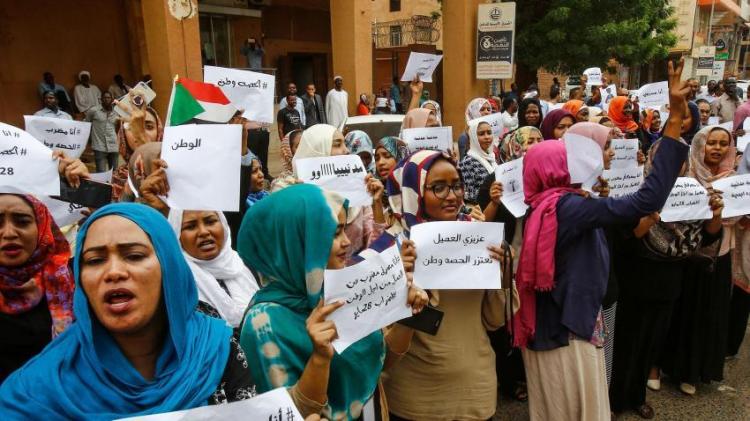Internal and regional formulas make it difficult for Sudanese army to replicate Egyptian model
According to well-informed Gulf sources, UAE, Saudi Arabia and Egypt are interested in keeping Sudan away from Qatar and Turkey in a way that doesn’t support military council’s options against the will of Sudanese civilian forces.
New features of Sudanese foreign policy that seemed closer to Arab countries opposed to Turkey-Qatar axis, emerged during months after former president Omar Al-Bsheer was ousted in which the military group takes over the country practically.
Internal situation is experiencing a stress between transitional military council emerged after Al-Bashir oust and opposition forces led by the leftist “Sudanese Professionals Association”.
Sudanese cities witnessed a public strike called by ” the Association” on Tuesday and Wednesday to press on transitional military council after negotiations between the two failed.
“We will not be back from our demands in achieving our stated aims of Freedom and Change Statement including establishment of transitional civil authority as a priority, and we will resist the obstacles facing our aims” twitted “Professional Association”, one of ” Freedom and Change” forces that leads popular movement in Sudan, on its webpage.
At the same day, one woman was killed and several people were injured by security forces near sit-in headquarter in central Khartoum.
While the main focus of the dispute was on the transitional government shape and its duration, military’s rush to ask for external support became the focus of Sudanese opposition forces rejection.
Sudan’s military ruler, Lt. Gen. Abdel Fattah Al-Burhan and his deputy Gen. Muhammad Hamdan Daqlo have been on a visit to both UAE and Egypt last week.
Sheikh Muhammad Bin Zayed Al-Nahyan, Crown Prince of Abu Dhabi confirmed UAE’s full support for Sudan during his meeting with Al-Burhan in Abu Dhabi. Bin Zayed stressed on “The importance of the dialogue between the Sudanese at this critical stage.” As Emirates News Agency stated.
On Tuesday, UAE announced aid to Sudan where UAE Red Crescent started a number of development projects in Sudan as part of its “Tolerance Year” initiatives in support of UAE’s efforts to rehabilitate infrastructure and support development in Sudan.
The aid included drilling 10 artesian wells, supporting health sector with medical equipment, distribution of Ramadan food and organizing breakfast tables.
UAE directs the Red Crescent to provide aid to friend countries.
After Al-Burhan’s visit to Abu Dhabi, the “Akhbar Al-Saha” newspaper issued by the Emirates Center for Strategic Studies and Research (ECSSR) wrote that UAE support for Sudan stems from several considerations. First, it is aligned with the will of the Sudanese people. Second, is the support of the national consensus to pass Sudan to safety. Third, is to support the efforts of the national dialogue between the different political forces and the military council. Fourth, is to affirm the strength and solidity of UAE-Sudan relations.
Following the tour of the military officials, Gen. Muhammad Hamdan Daqlo, confirmed the support of his country to Saudi Arabia in the face of what he called “all Iranian and Huthi militias threats and attacks.” Sudan is a member of Arab Coalition that is fighting Houthi group in Yemen.
Sudanese opposition forces feel anxiety that the military council will receive support from Saudi-UAE-Egyptian axis, supporting the military’s stance against the opposition’s attempts to hand over power to a civilian government.
In a statement to the German Press Agency, Muhammad Naji Al-Assam, a leader in “Professionals Association” said: “Everyone knows that the call for strike issued after the role of the military council turned from a temporary authority to strengthening its position and acting as it is the sole ruler of the country … as well as starting to establish foreign relations” stressing that “council’s outdoor tours will not benefit them.”
“Professionals Association” finds itself in a complex position. It is opposed to Muslim Brotherhood and considers it as part of the former regime, but at the same time it fears of unpredictable calculations of the military council.
Sudanese protesters started to declare publically by cheering that they refuse imposing Egyptian model in Sudan. On its Twitter account, “Professionals Association” wrote that a delegation of the “Association” met the Egyptian ambassador in Khartoum, Hossam Issa last Tuesday.
It mentioned that the meeting began with “Ambassador’s confirmation on basic principles including Egypt’s commitment not to interfere in Sudanese affairs and not to impose any model or experience on the situation in Sudan and also, its understanding of the different details and experiences between the two countries.” However, military council is not likely to hand over power as the civilians propose it.
Gen. Daqlo warns on Tuesday that “There are ambush countries want Sudan to be like Syria or Libya”, he spoke about “Confirmed information of many contacts with third parties”, the thing may lead to a campaign of arrests likely to be politicized.
According to well-informed Gulf sources, UAE, Saudi Arabia and Egypt are interested in keeping Sudan away from Qatar and Turkey in a way that doesn’t support military council’s options against the will of Sudanese civilian forces.
These countries fear that the military council may be forced to accept support from the political forces of Muslim Brotherhood.
This is the issue that may have been carried by military council during its visits to Egypt, UAE and Saudi Arabia.
Will these countries accept this barter? UAE and Saudi Arabia are unlikely to risk doing so because of their support for controversial military leaders such as Al-Sisi in Egypt and Khalifa Hafter in Libya.
NPA – Riyadh

